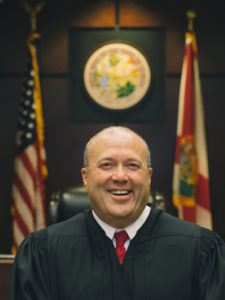
‘She slashed a hole in all four tires’
Ask Judge Smith

By Layne Smith
Special to the Outlook
Q: Judge Smith, last weekend my favorite niece was arrested for “criminal mischief.” What does that mean and how serious is the charge? Sincerely, a mystified Uncle Jimmy
A: Uncle Jimmy, you are mystified because the label is misleading. “Mischief” sounds like a good-natured prankster having some harmless fun. However, “criminal mischief” occurs when someone “willfully and maliciously” injures or damages the property of another. It includes acts of vandalism and graffiti.
Criminal mischief cases always remind me of Carrie Underwood’s song, “Before He Cheats.” My daughter is home from college this summer, and much to her annoyance, I have whistled that tune all afternoon. It could have been worse—I could have sung it.
The lyrics of “Before He Cheats” describe a textbook case of criminal mischief. Consider these lines from the song:
“I dug my key into the side of his pretty little souped-up four-wheel drive (vandalism / damage);
“Carved my name into his leather seats (vandalism / damage);
“I took a Louisville Slugger to both headlights (property damage);
“Slashed a hole in all four tires (property damage);
“Maybe next time he’ll think before he cheats (motive: anger, revenge).”
Criminal mischief can be a crime of jealousy, spitefulness or even revenge.
For example, Bob is dating Sally but suspects she might be seeing someone else on the side. Bob “gets even” by pouring bleach on Sally’s wardrobe or throwing a brick through the front windshield of her car. Bob is then charged with criminal mischief. Don’t be like Bob.
Uncle Jimmy, you also asked about the seriousness of the crime. If the alleged property damage is $200 or less, the defendant can be charged with a second-degree misdemeanor, which is punishable by up to 60 days in the county jail, a $500 fine, court costs and payment of restitution to make the victim whole.
If the alleged property damage is greater than $200 but less than $1,000, the defendant can be charged with a first-degree misdemeanor, which is punishable by up to a year in the county jail, a $1,000 fine, court costs and restitution.
If the alleged property damage is $1,000 or greater the defendant can be charged with a third-degree felony, which is punishable by up to five years in state prison, a $5,000 fine, court costs and restitution. Some collateral effects of a felony conviction include the loss of the defendant’s right to vote, serve on a jury and own or possess firearms or ammunition.
Criminal mischief is also what’s called an “enhanceable offense.” For example, if a defendant with a prior conviction for criminal mischief is arrested for allegedly doing it again, he or she can be charged with a third-degree felony. If your niece is on probation or on pretrial release for a prior crime, she might be arrested for violating those terms by allegedly committing criminal mischief. If that’s the situation, she will be held on the prior case until the judge rules otherwise.
Depending on her circumstances, the charge your niece faces could be minor or quite serious. She would be well advised to maintain her Fifth Amendment right against self-incrimination and not discuss the facts of her case with anyone other than her attorney – not even family members.
Email questions about civics or law to askjudgesmith@gmail.com and we will talk again in two weeks. J. Layne Smith is a Leon County Judge who handles a wide variety of criminal and civil cases. He often speaks and writes about civics, the law, our legal system and the administration of justice.







